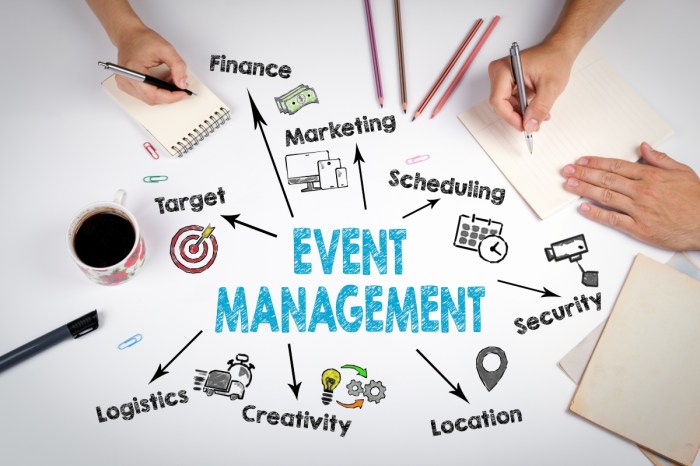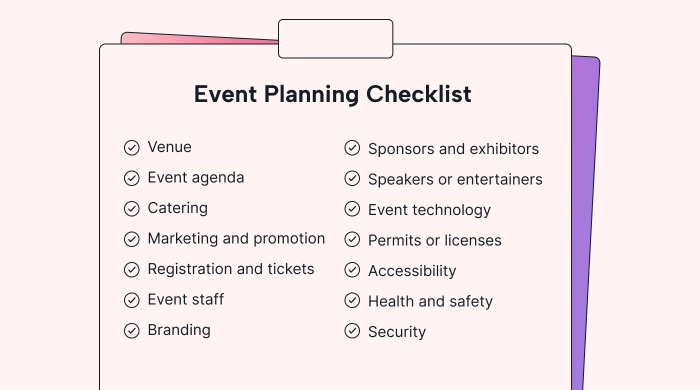Event Planning Tips: Whether you’re organizing a school dance, a charity fundraiser, or a corporate conference, mastering the art of event planning is crucial for success. From setting objectives to selecting the perfect venue, this guide will provide you with all the tips and tricks you need to ensure your event is a hit.
Importance of Event Planning
Proper event planning is crucial for the success of any event. It involves meticulous attention to detail, coordination, and organization to ensure that everything runs smoothly from start to finish.
Impact of Thorough Event Planning
- Reduces the risk of last-minute issues and uncertainties.
- Helps in setting clear goals and objectives for the event.
- Ensures effective budget management and resource allocation.
- Enhances the overall attendee experience and satisfaction.
Examples of Successful Events
1. Coachella Music Festival
Known for its seamless organization and diverse lineup of artists, Coachella is a prime example of a well-planned event that attracts thousands of attendees each year.
2. TED Talks
These thought-provoking conferences are meticulously planned to provide a platform for influential speakers to share their ideas with a global audience.
3. Apple Product Launch Events
Apple’s product launches are meticulously choreographed events that generate significant buzz and excitement among consumers.
Setting Objectives and Goals
Setting clear objectives for an event is crucial to ensure its success. By defining specific goals, event planners can focus on what needs to be achieved and measure the event’s effectiveness. Aligning these goals with the event’s purpose helps create a cohesive and impactful experience for attendees.
Process of Setting Objectives
When setting objectives for an event, it’s important to consider the purpose of the event and what you hope to accomplish. Begin by defining the overall goal of the event, whether it’s to raise awareness, drive sales, or promote a cause. From there, break down this goal into specific, measurable objectives that can be tracked and evaluated.
- Example: For a fundraising gala, the main goal could be to raise $50,000 for a charity. Specific objectives could include selling a certain number of tickets, securing sponsorships, and reaching out to potential donors.
- Example: In a corporate conference, the main goal might be to educate attendees on industry trends. Measurable objectives could include securing keynote speakers, organizing breakout sessions, and collecting feedback from participants.
Aligning Goals with Event’s Purpose
Aligning goals with the event’s purpose ensures that every aspect of the event works towards achieving the desired outcome. Whether it’s creating a memorable experience for guests or generating leads for a business, setting goals that tie back to the event’s purpose helps maintain focus and drive success.
Remember, setting objectives and goals for an event is not just about having a checklist of tasks to complete. It’s about creating a roadmap that guides the planning process and ensures that every decision made contributes to the overall success of the event.
Budgeting for Events
Planning an event without a budget is like trying to drive without a map. It’s crucial to have a detailed budget in place to keep your event on track financially. By setting a budget, you can allocate funds effectively, identify areas where costs can be reduced, and ensure you’re not overspending.
Allocating Funds Effectively
When budgeting for an event, it’s essential to prioritize your expenses based on what will have the most significant impact on the event’s success. Here are some tips for allocating funds effectively:
- Allocate the majority of your budget to key elements like venue rental, catering, and entertainment.
- Consider the needs and preferences of your target audience when deciding where to allocate funds.
- Don’t forget about hidden costs like permits, insurance, and staff wages. Factor these into your budget from the start.
Cost-Saving Strategies
Organizing a successful event doesn’t have to break the bank. Here are some strategies for saving costs without compromising quality:
- Look for sponsors or partners willing to contribute financially or provide in-kind services.
- Opt for a less expensive venue or consider hosting the event outdoors to save on rental fees.
- Shop around for vendors and negotiate prices to get the best deals without sacrificing quality.
- Consider DIY options for decorations, invitations, and other elements to cut down on expenses.
Venue Selection
When it comes to selecting the perfect venue for an event, there are several key factors to consider that can make or break the overall experience for attendees. From location to capacity, each aspect plays a crucial role in the success of your event.
Factors to Consider
- Location: Choose a venue that is easily accessible and convenient for attendees to reach.
- Capacity: Ensure that the venue can accommodate the expected number of guests without feeling overcrowded.
- Amenities: Check for amenities such as parking, restrooms, catering options, and AV equipment to meet your event needs.
- Ambiance: Consider the ambiance and style of the venue to align with the theme and tone of your event.
- Budget: Keep your budget in mind when selecting a venue to avoid overspending on this aspect of your event.
Checklist of Amenities and Requirements
| Amenity/Requirement | Description |
| Parking | Ensure there is ample parking space for attendees who will be driving to the event. |
| Restrooms | Check that the venue has clean and well-maintained restroom facilities available. |
| Catering Options | Verify if the venue offers catering services or allows for external catering vendors. |
| AV Equipment | Confirm if the venue provides audiovisual equipment or if you need to bring your own. |
Impact on Attendee Experience
The venue choice can significantly impact the overall experience for attendees. A well-chosen venue that meets all the necessary requirements and provides a pleasant atmosphere can enhance guest satisfaction and make the event more memorable. On the other hand, a poorly selected venue with limited amenities or a less-than-ideal location can lead to attendee dissatisfaction and affect the success of the event.
Event Marketing and Promotion
Marketing and promoting an event is crucial to ensure its success and reach a wider audience. Utilizing effective strategies can help create buzz and generate interest in your event.
Utilizing Social Media and Online Platforms
- Utilize social media platforms such as Facebook, Instagram, Twitter, and LinkedIn to promote your event. Create engaging posts, share behind-the-scenes content, and run targeted ads to reach your desired audience.
- Collaborate with influencers or industry leaders to promote your event to their followers, expanding your reach and credibility.
- Create a dedicated event website or landing page where attendees can find all the necessary information and easily register for the event.
Successful Event Marketing Campaigns Examples
1. Coachella Music Festival
Coachella’s marketing strategy focuses on creating hype through social media teasers, lineup announcements, and influencer partnerships.
2. Apple Keynote Events
Apple generates excitement for its product launches through exclusive invites, live streams, and social media teasers, building anticipation among its loyal fan base.
3. SXSW Festival
SXSW leverages user-generated content, influencer partnerships, and interactive experiences to engage attendees and create a buzz around the event.
Logistics and Operations: Event Planning Tips

When it comes to event planning, logistics and operations play a crucial role in ensuring everything runs smoothly. From coordinating vendors to managing staff and equipment, attention to detail is key to the success of any event.
Importance of Logistics in Event Planning, Event Planning Tips
Logistics involve the detailed coordination and organization of all the moving parts of an event. This includes everything from transportation and setup to scheduling and communication. Without effective logistics, even the best-planned event can quickly unravel.
Coordinating Vendors, Staff, and Equipment
- Work closely with vendors to ensure timely delivery of goods and services.
- Provide clear instructions to staff members on their roles and responsibilities during the event.
- Coordinate equipment rentals and setup to ensure everything is in place before the event begins.
Tips for Managing Operations Smoothly
- Establish a detailed timeline and schedule to keep everyone on track.
- Designate a point person to handle any issues or emergencies that may arise during the event.
- Communicate regularly with all stakeholders to ensure everyone is on the same page.
Technology and Event Planning
In the fast-paced world of event planning, technology plays a crucial role in ensuring smooth operations and successful outcomes. From streamlining communication to enhancing attendee experiences, innovative tools and software have revolutionized the way events are organized and executed.
Event Management Software
- Event management software like Eventbrite and Cvent helps in planning and managing all aspects of an event, from registration and ticketing to attendee engagement and feedback.
- These tools enable event planners to create customized event websites, send out invitations, track RSVPs, and analyze event data for future improvements.
Virtual Event Platforms
- With the rise of virtual events, platforms like Zoom and Hopin have become essential for organizing online conferences, webinars, and trade shows.
- These platforms offer features such as live streaming, virtual networking, and interactive sessions, providing a seamless virtual event experience for attendees.
RFID Technology
- RFID technology has transformed attendee engagement and security at events by enabling contactless check-ins, cashless payments, and personalized experiences.
- Event planners can use RFID wristbands or badges to track attendee movements, collect data on popular sessions, and optimize event layouts for better flow.
Emergency Preparedness

When it comes to event planning, one crucial aspect that should never be overlooked is emergency preparedness. Having a contingency plan in place can make all the difference in ensuring the safety and well-being of attendees, staff, and participants.
Importance of Contingency Plan
Being prepared for unexpected situations during events is vital to handle emergencies effectively. Here are some strategies to consider:
- Designate a dedicated team for emergencies with clearly defined roles and responsibilities.
- Conduct thorough risk assessments prior to the event to identify potential hazards.
- Establish communication protocols and emergency response procedures.
- Provide appropriate training for staff and volunteers on how to respond to different types of emergencies.
Successful Emergency Responses
Here are a few examples of successful emergency responses at events:
- During an outdoor music festival, a sudden thunderstorm hit the area. The event organizers had a contingency plan in place and quickly evacuated attendees to safe locations, preventing any injuries.
- At a corporate conference, a participant suffered a medical emergency. The event staff immediately called for medical assistance and provided first aid until help arrived, ensuring the attendee received prompt care.
